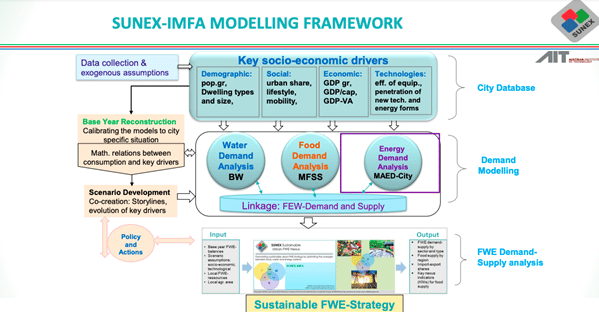Join JPI UE
Faq
FAQ
Please click here for the frequently asked questions we collected.
If you have an additional questions you are welcome to mail us at info@jpi-urbaneurope.eu
The approach will be applied in four case study cities refl ecting diff erent socio-economic and climate characteristics, different consumption patterns and diff erent local and remote FWE resource shares. A monitoring and control sensor network will be tested to improve water and energy savings for local food production. The results will feed into FWE-supply guidelines ensuring replication to support the transition towards higher urban resilience.

SUNEX-IMFA is an integrated modelling framework focused on constructing alternative development pathways and their impacts on supply and demand for food-water-energy and their key nexus-effects. The first pathway is a ‘business as usual’ scenario that describes a continuation of historical trends, including recently enacted food-water-energy policy trends without additional measures on sustainable development. The second pathway is a ‘sustainable development scenario,’ where modelling is done to reflect an active transition towards efficient, sustainable and low-carbon food-water-energy systems. Both scenarios are developed following consistent assumptions on expected future socio-economic and technological developments of the pilot cities considered.
The analysis aims to better understand the interactions between selected policy areas, to identify trade-offs and co-benefits and to prioritize policy and associated action to support the optimization of food-water and energy nexus in a context of climate change mitigation and post-covid recovery actions.
Read more about the guidelines
Read the results interview!
SUNEX (Sustainable Urban FWE Nexus) – Formulating sustainable urban FWE strategy by optimizing the synergies between food, water and energy systems
Duration: 2018–2021
Web: http://sunex-project.eu/wp/
Contact: Dr. Wolfgang Loibl and Dr. Ali Hainoun, AIT Austrian Institute of Technology
E-mail: wolfgang.loibl@ait.ac.at, ali.hainoun@ait.ac.at
Budget: 1.476.383 €
Partners: AIT Austrian Institute of Technology, Leibniz Centre for Agricultural Landscape Research (ZALF), University of the West of England, Bristol Water, Qatar Environment and Energy Research Institute, Qatar Ministry for Municipality and Environment, ROC Connect